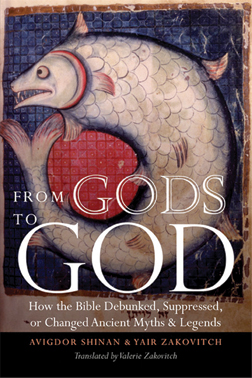“From Gods to God” by Avigdor Shinan and Yair Zakovitch. Translated by Valerie Zakovitch. Jewish Publication Society
 Bible study is different from most other forms of learning. Normally, the more you study a subject, the more you know. But sometimes it seems that the more you study the Bible, the less you know. Case in point: everyone “knows” that David killed Goliath. But look at 2 Samuel 21:19, which gives credit to Elhanan.
Bible study is different from most other forms of learning. Normally, the more you study a subject, the more you know. But sometimes it seems that the more you study the Bible, the less you know. Case in point: everyone “knows” that David killed Goliath. But look at 2 Samuel 21:19, which gives credit to Elhanan.
Anomalies such as this are at the heart of Shinan and Zakovich’s “From Gods to God,” which explores the Tanach (Hebrew Bible) not as a unified whole but rather as a collection of documents, some of which contradict each other, each with its own purpose. The authors’ central thesis is to show how “we often become aware that the official version of a story (i.e., the Bible’s version) was meant to dispute views and opinions that were accepted when the story still made its way orally through the world.”
In particular, they demonstrate how, in a number of occasions, the biblical authors’ purpose was to reconcile narratives based on polytheistic sources with the monotheism that had become central to Jewish theology. One well-known example, for which they give credit to Cassuto, can be found in Genesis 1:21, where God is given credit for creating the sea monsters, a line which may seem overly specific in its context, until we realize that it was meant to refute other creation stories that were well known at the time, in which God’s creation of the world involved triumphing over forces of the sea.
Later biblical authors allude to these tales (Isaiah 51:9, Job 38: 8-11), raising the perhaps troubling possibility that at least parts of the Torah were written after some of the other books. Likewise, the authors point to a number of other instances where the biblical authors sought to demythologize hero stories, as in the story of Samson, where his status as a sun god (Shimshon, his Hebrew name, being a variant of shemesh, Hebrew for “sun”). They further suggest that the birth narrative may be directed at refuting alternative versions of the story in which the angel who announces Samson’s birth may actually be his father.
Sometimes, the authors contend, the intention of the biblical authors may have been political. For example, there are two different accounts of Rachel’s burial place. While Genesis puts it in the South, near Bethlehem, 1 Samuel 10:2 places it in the territory of Benjamin, a northern location. This may have reflected the rival kingdoms’ desire to be considered the legitimate heirs of the patriarchal legacy.
Likewise, there is the puzzling incident in which the Northern king, Jeroboam, builds two golden calves. The authors suggest (as have others before them) that the story of the Golden Calf is a Southern story meant to defame him. (Note: since the calves have not been found, it is possible that the story of Jeroboam was written later, for the same purpose).
These are just a few of the 30 topics discussed in this fascinating book. The one aspect of their methodology which I might question is their assumption that rabbinic literature often contains versions of the narrative that were suppressed by the “official” narrative rather than representing new versions intended to meet the needs of later generations. Sometimes they may be finding a gap where none exists, as where they assert that the ascension of Elijah to heaven (from the same place where Moses is buried) proves that a similar story about Moses’ death has been suppressed. I also disagree with their interpretation of the book of Ruth, which they see as an attempt to provide information about David’s ancestry. The more likely interpretation is that its purpose was to advocate for the acceptance of people not of Jewish birth who were willing to accept Jewish law and belief.
Nevertheless, this book will open readers’ eyes to a whole new way of reading our sacred texts. It could forever change the way its readers will approach the subject. The term “must read” may be overused, but I believe it is appropriate in describing this book.
Stuart Lewis holds a doctoral degree in English from the University of Colorado. He writes from Prairie Village, Kan.


